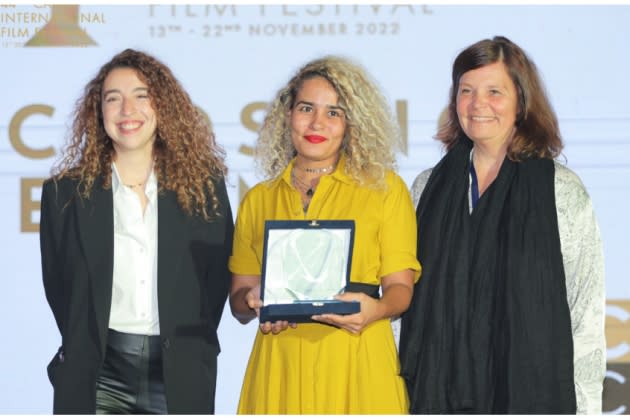‘I Want to Focus on Sudanese Women’: Suzannah Mirghani Talks ‘Empowering Drama’ ‘Cotton Queen’

“For me, honestly, the most important thing is to focus on Sudanese women,” Suzannah Mirghani tells Variety.
“We have so many documentaries about them already and there was a time when these stories were in terrible need of being told. But the culture has shifted. Now, we have to let Sudanese people make their own [films].”
More from Variety
Bassem Breche Creates Controversy in Egypt With Mother-Daughter Melodrama 'Riverbed'
Fiery Palestinian Coming-of-Age Drama 'Alam' Wins Top Prize at Cairo Film Festival
Currently developing her fiction feature debut “Cotton Queen,” the Sudanese-Russian filmmaker is coming back to the story she explored in her short “Al-Sit” in 2020. It shows a teenage girl living in a cotton-farming village, learning about life and love under the watchful eye of her grandmother, until a young businessman from abroad decides to marry her.
“There is no infrastructure in Sudan, no film industry, so I thought I would start small,” she explains. Mirghani is now based in Doha.
“I went there with some money and a script. That’s all I had. I wanted you to see how wonderful it could be, and now I want to give you even more of this story and these characters.”
The project, awarded the ArteKino Award at Cannes’ L’Atelier earlier this year, was also noticed at Cairo Film Connection co-production market, with MAD Solutions granting Mirghani its award for distribution and marketing in the Arab world with a $50,000 minimum guarantee.
Backed by ZDF/Arte, the German-French Funding Commission for the FFA/CNC Mini-Traité and the Doha Film Institute, it’s produced by Caroline Daube for Munich-based Strange Bird. Didar Domehri (Maneki Films) and Annemarie Jacir (Philistine Films) co-produce.
“Doha Film Institute has a scriptwriting workshop and Annemarie Jacir was my mentor. By the time we wrapped, she came onboard and said: ‘I am going to introduce you to your future producer.’ I kept telling her I wanted to work with a woman,” laughs Mirghani, with Daube adding: “It’s like a wedding. You will spend a long time together, going through all sorts of crises. But there will be beautiful moments as well.”
Mirghani – hoping to shoot next autumn – will stray a bit from her short, however, especially when it comes to her main character.
“In the short, she doesn’t speak. Now, she tells you her story. She says exactly how she feels and what she wants, and her voice is so strong,” she says.
“As a teenager, you have very little power. Then add to that this Sudanese tradition of arranged marriage, which is the norm. In the film, I am not pointing fingers – this is how people live their lives. I just want you to put yourself in her shoes. How does she feel about it, especially if she already has feelings for someone else?”
Despite dealing with some darker issues and touching on the practices in the cotton industry, Mirghani sees it as a light story, told from the perspective of a “feisty, bright” girl.
“We kept thinking about what genre it is and we came up with our own: ‘empowering drama.’ It’s so universal, even though it’s a Sudanese story,” says Daube.
“So many threads running through the film are connected to my own memories from Sudan. I grew up there and to me, it will always be tinged with nostalgia,” adds the director.
But the film will also feature elements of magical realism, with Daube citing Alice Rohrwacher’s “Happy as Lazzaro” as an inspiration. “This story is based on fables and fairytales, as they were present also during my childhood,” says Mirghani. “I don’t think I have ever made a ‘straight’ film in my life. Why would I, when cinema gives you all these opportunities?”
Speaking of opportunities – creating a platform for Sudanese filmmaking and empowering the region is a priority for the team, says Daube. But it won’t come easily.
“Doing something like this in Sudan means that things you normally wouldn’t even consider to be a problem, can be a problem. Take the lack of electricity,” states Mirghani.
“The whole point is to keep the momentum going. And for the film industry in Sudan to grow.”
Best of Variety
Sign up for Variety’s Newsletter. For the latest news, follow us on Facebook, Twitter, and Instagram.

 Yahoo News
Yahoo News 